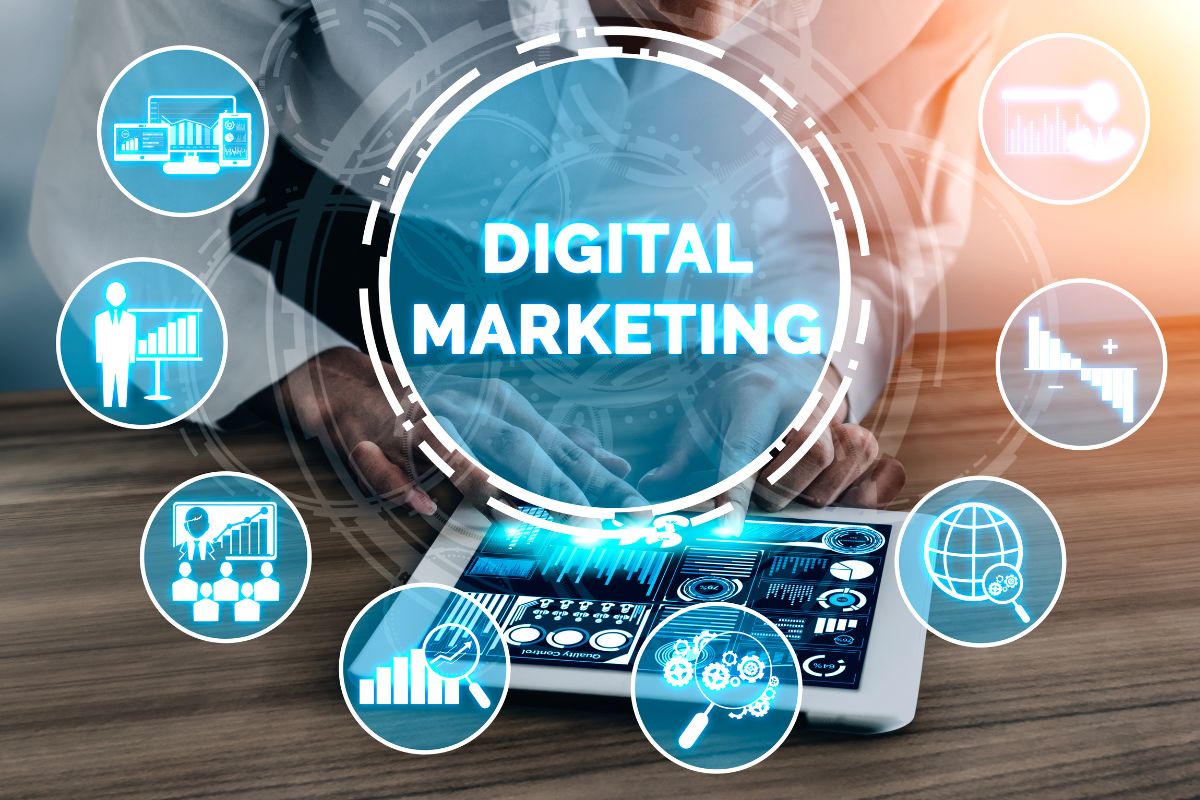Digital marketing is a way of promoting products or services using the internet and digital tools to reach customers. It includes various types of content like videos, blogs, social media posts, online ads, and email newsletters. People can see this type of marketing on devices like computers, laptops, smartphones, tablets, or apps.
Since more than 70% of the world is online, and the number keeps growing, businesses are now spending more on digital marketing and cutting back on traditional methods.
Digital marketing isn’t just about posting ads on Instagram. It’s about using smart strategies to connect with customers at every step of their buying journey.
Data is a key part of digital marketing. Using tools to track customer behavior in real time, marketers can gather important insights and create content that matches the audience’s preferences. For instance, Starbucks uses data from their mobile rewards app to spot seasonal trends and design special offers that customers love.
Importance of Digital Marketing
Digital marketing is important because it helps businesses connect with their customers in a world where people spend most of their time online. It offers many benefits that traditional marketing cannot provide. Let’s explore the main reasons why digital marketing is essential for businesses today.
1. Increased Reach and Visibility
With digital marketing, businesses can reach a global audience. Traditional marketing methods like TV or print ads are limited to specific regions, but digital platforms allow companies to connect with customers worldwide. For example, social media platforms like Facebook and Instagram have billions of users, making it easy for businesses to showcase their products to a large audience.
Increased visibility through digital marketing ensures that your business stands out from competitors and stays top of mind for customers.
2. Cost-Effective Marketing
One of the biggest advantages of digital marketing is its cost-effectiveness. Compared to traditional advertising methods such as TV, radio, or print ads, digital marketing campaigns are much more affordable. Small businesses, in particular, can benefit from low-budget strategies like social media marketing or SEO to grow their audience.
For example, running a Google Ads campaign allows you to set your budget and target specific demographics, ensuring you only pay for results.
3. Measurable Results
Unlike traditional marketing, digital marketing provides measurable results. Businesses can track the performance of their campaigns in real-time using analytics tools like Google Analytics or Facebook Insights. Metrics such as website traffic, click-through rates, and conversion rates help businesses understand what is working and what needs improvement.
This data-driven approach allows companies to make informed decisions and optimize their marketing strategies for better results.
4. Improved Customer Engagement
Digital marketing helps businesses engage with their customers on a personal level. Through social media platforms, companies can interact with their audience by responding to comments, answering queries, and sharing valuable content. This two-way communication builds trust and strengthens the relationship between the brand and its customers.
Additionally, personalized email campaigns and targeted ads make customers feel valued, increasing their loyalty to the brand.
Want to learn how to optimize your campaigns for measurable results? Our Digital Marketing Course equips you with the tools and techniques to succeed.
5. Targeted Advertising
Digital marketing allows businesses to target specific audiences based on demographics, interests, and online behavior. This level of precision ensures that marketing efforts are directed at the right people, resulting in higher conversion rates.
For example, a clothing brand can target ads to women aged 18-35 interested in fashion. This targeted approach saves time and money while increasing the chances of reaching potential customers.
6. Better ROI (Return on Investment)
Digital marketing offers a higher return on investment compared to traditional marketing methods. Since it is cost-effective and measurable, businesses can focus their resources on strategies that deliver the best results. For instance, an email marketing campaign can generate significant revenue with minimal investment, making it an excellent tool for maximizing ROI.
8. Building Brand Awareness
Digital marketing plays a crucial role in building brand awareness. A strong online presence ensures that customers recognize and trust your brand. Platforms like YouTube, Instagram, and TikTok allow businesses to create engaging content that resonates with their audience, boosting brand visibility.
Moreover, consistent efforts in SEO and content marketing help businesses rank higher on search engines, making them more discoverable to potential customers.
9. Catering to Mobile Users
With the increasing use of smartphones, mobile marketing has become an integral part of digital marketing. People spend hours browsing the internet, shopping, and interacting on their mobile devices. Businesses that optimize their websites and campaigns for mobile users can tap into this growing market and provide a seamless experience to their customers.
10. Competing with Larger Brands
Digital marketing levels the playing field for small and medium-sized businesses. With the right strategy, smaller businesses can compete with larger brands by targeting niche markets and leveraging cost-effective channels. For example, a small local café can use social media to attract customers and build a loyal following, just like a big chain.
Types of Digital Marketing
1. Search Engine Optimization (SEO)
SEO is the process of improving a website’s visibility on search engines like Google. It focuses on optimizing keywords, content, and website structure to rank higher on search results. SEO is a long-term strategy that helps businesses attract organic traffic and build credibility with users who trust search engine recommendations.
Benefits of SEO:
- Attracts free, organic traffic.
- Builds long-term brand trust.
- Increases website visibility.
Example: A bakery’s website optimized for “best cupcakes in Dubai” ranks on the first page of Google.
2. Pay-Per-Click Advertising (PPC)
PPC is an online advertising method where businesses pay only when their ad is clicked. These ads often appear at the top of search engine results or social media feeds. PPC campaigns are highly targeted and can be adjusted based on performance, making them a cost-effective way to generate quick leads.
Benefits of PPC:
- Provides immediate results.
- Targets specific audiences.
- Allows easy budget control.
Example: An online shoe store runs a Google Ad for “affordable running shoes” and gains clicks instantly.
3. Content Marketing
Content marketing involves creating and sharing valuable information like blogs, videos, or infographics to attract and engage an audience. This strategy focuses on building trust by addressing customer questions or problems, ultimately driving profitable customer actions over time.
Benefits of Content Marketing:
- Builds brand authority.
- Increases audience engagement.
- Supports SEO efforts.
Example: A tech company publishes a blog, “Top 5 Gadgets for Productivity,” and attracts tech-savvy readers.
4. Social Media Marketing
Social media marketing uses platforms like Facebook, Instagram, and LinkedIn to promote products and engage with customers. It’s an interactive way to build relationships with your audience and showcase your brand’s personality through creative posts, stories, or ads.
Benefits of Social Media Marketing:
- Increases brand awareness.
- Builds direct customer relationships.
- Offers affordable promotion options.
Example: A fashion brand shares Instagram reels showcasing its winter collection, gaining likes and shares.
5. Email Marketing
Email marketing is a direct communication strategy where businesses send newsletters or promotional offers to their subscribers. It’s a cost-effective way to maintain relationships with customers and encourage repeat purchases by sharing tailored content or discounts.
Benefits of Email Marketing:
- Low-cost marketing option.
- Delivers personalized content.
- Encourages customer retention.
Example: A hotel sends an email offering a 20% discount on bookings to its regular guests.
6. Affiliate Marketing
Affiliate marketing involves partnering with affiliates who promote your products or services. Businesses pay a commission to affiliates for every sale made through their referral links. It’s a win-win strategy where both the business and affiliates benefit.
Benefits of Affiliate Marketing:
- Expands reach without upfront costs.
- Boosts sales effectively.
- Builds partnerships with influencers.
Example: A fitness blogger promotes a protein powder brand and earns a commission for each purchase made through their link.
7. Influencer Marketing
Influencer marketing leverages the audience of social media influencers to promote a brand. These influencers have a loyal following and can authentically recommend products, making this strategy effective for reaching niche markets.
Benefits of Influencer Marketing:
- Builds trust with audiences.
- Targets specific demographics.
- Drives quick engagement.
Example: A skincare influencer shares a video using a moisturizer, leading to increased sales for the brand.
8. Video Marketing
Video marketing uses videos to educate, entertain, or promote a product. Platforms like YouTube, TikTok, and Instagram are perfect for sharing engaging video content. Videos are more likely to grab attention, making this a powerful marketing tool.
Benefits of Video Marketing:
- Boosts engagement rates.
- Increases conversion rates.
- Appeals to all age groups.
Example: A restaurant creates a short video showing how its signature dish is prepared, attracting food lovers.
9. Search Engine Marketing (SEM)
SEM combines SEO and paid advertising to increase visibility on search engines. Businesses bid on keywords to display ads at the top of search results, driving traffic and leads. It’s an ideal strategy for businesses that want quick results.
Benefits of SEM:
- Delivers immediate traffic.
- Complements organic SEO efforts.
- Allows precise audience targeting.
Example: A travel agency runs ads for “budget-friendly Maldives trips” and receives bookings within hours.10. Mobile Marketing
Mobile marketing focuses on reaching users through their smartphones via SMS, apps, or mobile-friendly websites. With mobile device usage rising, this strategy helps businesses connect with customers anytime, anywhere.
Benefits of Mobile Marketing:
- Reaches users on the go.
- Encourages instant action.
- Supports local promotions.
Example: A coffee shop sends a text offering “Buy 1 Get 1 Free” deals to customers nearby.
Benefits of Digital Marketing
1. Global Reach
Digital marketing allows businesses to reach customers across the globe. With the internet, there are no geographical barriers, making it possible for small businesses to compete with larger companies in international markets. This is especially beneficial for businesses offering products or services online.
Why It’s Important:
- Expands market potential.
- Attracts a diverse audience.
- Increases brand recognition worldwide.
Example: A small handmade jewelry store in Dubai sells its products to customers in the USA through social media ads.
2. Cost-Effectiveness
One of the biggest advantages of digital marketing is its affordability. Compared to traditional advertising methods like TV or print ads, digital marketing offers better results at a fraction of the cost. Businesses can choose their budget and adjust campaigns to maximize returns.
Why It’s Important:
- Ideal for small businesses with limited budgets.
- Reduces overall marketing costs.
- Ensures high ROI (Return on Investment).
Example: A startup spends $100 on a Google Ads campaign and generates $500 in sales.
3. Targeted Audience Reach
Digital marketing allows businesses to target specific audiences based on demographics, interests, behavior, and location. This ensures that the right message reaches the right people at the right time, improving the chances of conversion.
Why It’s Important:
- Reduces wasted ad spend.
- Increases campaign effectiveness.
- Boosts customer engagement.
Example: A fitness center targets young adults in a specific city through Instagram ads, offering discounts on memberships.
4. Measurable Results
Unlike traditional marketing, digital marketing provides measurable results in real-time. Businesses can track the performance of their campaigns through analytics tools, allowing them to make data-driven decisions and optimize their strategies.
Why It’s Important:
- Helps identify what works and what doesn’t.
- Tracks ROI and campaign performance.
- Provides insights for future planning.
Example: An e-commerce store uses Google Analytics to see how many people clicked on their ad and completed a purchase.
5. Improved Customer Interaction
Digital marketing enables direct communication with customers through various channels like social media, email, and chatbots. This helps businesses understand customer needs, address concerns, and build stronger relationships.
Why It’s Important:
- Enhances customer satisfaction.
- Builds brand loyalty.
- Creates a personalized experience.
Example: A clothing brand responds to customer inquiries on Instagram, helping them choose the right size and style.
6. Flexibility and Adaptability
Digital marketing campaigns can be quickly adjusted to suit changing market trends or customer preferences. This flexibility allows businesses to experiment with different strategies and find what works best.
Why It’s Important:
- Keeps campaigns relevant.
- Saves time and resources.
- Allows for quick problem-solving.
Example: A travel agency modifies its ads to promote winter holiday packages during the holiday season.
7. Higher Conversion Rates
Digital marketing strategies like email marketing, PPC ads, and social media campaigns often lead to higher conversion rates. These methods are designed to attract interested customers and guide them toward taking action, whether it’s making a purchase, signing up, or contacting the business.
Why It’s Important:
- Drives sales growth.
- Boosts customer engagement.
- Generates quality leads.
Example: A restaurant sends an email with a limited-time discount, leading to more online reservations.
8. Enhanced Brand Awareness
Digital marketing helps businesses increase their visibility and establish a strong online presence. With consistent efforts, even new businesses can gain recognition and trust among their target audience.
Why It’s Important:
- Builds credibility over time.
- Attracts new customers.
- Encourages word-of-mouth promotion.
Example: A beauty brand shares tutorials and tips on YouTube, gaining subscribers and potential customers.
9. Personalized Marketing
Personalization is one of the most significant benefits of digital marketing. Businesses can tailor their messages and offers to suit individual customer preferences, making the marketing efforts more effective and engaging.
Why It’s Important:
- Improves customer experience.
- Increases customer retention.
- Boosts overall campaign success.
Example: An online bookstore recommends books based on a customer’s past purchases.
10. Level Playing Field for Small Businesses
Digital marketing gives small businesses an equal opportunity to compete with larger brands. With the right strategies and tools, even startups can attract customers and grow their business online.
Why It’s Important:
- Empowers small businesses.
- Reduces dependency on expensive advertising.
- Encourages innovation and creativity.
Example: A home-based bakery gains customers by promoting its cakes on Instagram and using local hashtags.
Career Opportunities in Digital Marketing
1. Search Engine Optimization (SEO) Specialist
An SEO specialist focuses on improving a website’s visibility on search engines like Google. Their goal is to drive organic traffic by optimizing keywords, creating high-quality content, and ensuring the website’s structure is search-engine-friendly.
Key Responsibilities:
- Conducting keyword research.
- Optimizing website content.
- Monitoring and improving website rankings.
How to Get Started: Learn SEO tools like Google Analytics and practice optimizing websites or blogs.
Career Tip: SEO specialists are in high demand as every business wants its website to appear on the first page of search results.
2. Content Marketing Specialist
Content marketing specialists create engaging and informative content to attract and retain an audience. This content can include blogs, articles, videos, infographics, and more. Their goal is to provide value to the audience while promoting the brand.
Key Responsibilities:
- Writing and editing content.
- Developing content strategies.
- Measuring content performance.
How to Get Started: Start by creating your own blog or portfolio to showcase your writing skills.
Career Tip: Strong storytelling skills can help you excel in this role.
3. Social Media Manager
Social media managers oversee a company’s presence on platforms like Facebook, Instagram, Twitter, and LinkedIn. They create posts, interact with followers, and run advertising campaigns to build brand awareness and engagement.
Key Responsibilities:
- Developing social media strategies.
- Scheduling and posting content.
- Analyzing social media performance.
How to Get Started: Learn social media tools like Hootsuite or Buffer and stay updated on platform trends.
Career Tip: Creativity and understanding your audience are crucial for success in social media management.
4. Pay-Per-Click (PPC) Specialist
PPC specialists create and manage paid advertising campaigns on platforms like Google Ads and social media. They ensure the ads reach the right audience and generate a high return on investment (ROI).
Key Responsibilities:
- Designing ad campaigns.
- Managing budgets and bids.
- Monitoring campaign performance.
How to Get Started: Learn Google Ads, Facebook Ads, and analytics tools to track campaign results.
Career Tip: A good PPC specialist knows how to target the right audience and optimize ad spending.
5. Email Marketing Specialist
Email marketing specialists use email campaigns to promote products, share updates, or nurture customer relationships. This role involves designing, testing, and analyzing email campaigns to achieve business goals.
Key Responsibilities:
- Writing email copy.
- Building and managing email lists.
- Tracking email open and click-through rates.
How to Get Started: Learn email marketing tools like Mailchimp or HubSpot and create sample campaigns.
Career Tip: Personalization is the key to successful email marketing.
6. Influencer Marketing Manager
Influencer marketing managers work with social media influencers to promote a brand. They identify the right influencers, negotiate deals, and manage collaborations to ensure successful campaigns.
Key Responsibilities:
- Finding and contacting influencers.
- Coordinating campaigns.
- Measuring campaign impact.
How to Get Started: Build relationships with influencers in your niche and study successful influencer campaigns.
Career Tip: Good communication skills and an understanding of influencer platforms are essential.
7. Affiliate Marketing Specialist
Affiliate marketing specialists manage partnerships with affiliates who promote a brand’s products or services. They track affiliate performance and ensure commissions are paid accurately.
Key Responsibilities:
- Recruiting affiliates.
- Managing affiliate programs.
- Tracking and analyzing sales data.
How to Get Started: Learn affiliate marketing platforms like Amazon Associates or ClickBank.
Career Tip: Strong analytical skills can help you thrive in affiliate marketing.
8. Digital Marketing Manager
Digital marketing managers oversee all digital marketing efforts, from SEO and social media to PPC and email campaigns. They develop strategies, set goals, and lead a team of digital marketers.
Key Responsibilities:
- Planning and executing marketing campaigns.
- Monitoring marketing budgets.
- Managing a team of specialists.
How to Get Started: Gain experience in various digital marketing roles before advancing to a managerial position.
Career Tip: Leadership and strategic thinking are crucial for this role.
9. Web Analytics Specialist
Web analytics specialists track and analyze website data to understand user behavior and improve online performance. They use tools like Google Analytics to gather insights that guide digital marketing strategies.
Key Responsibilities:
- Monitoring website traffic.
- Analyzing user behavior.
- Reporting insights to the marketing team.
How to Get Started: Learn web analytics tools and practice analyzing data for personal projects.
Career Tip: Data-driven decision-making can make you an invaluable part of any marketing team.
10. Video Marketing Specialist
Video marketing specialists create engaging video content to promote a brand. They work on everything from video scripting and production to editing and distribution on platforms like YouTube and TikTok.
Key Responsibilities:
- Producing promotional videos.
- Editing and optimizing videos.
- Tracking video performance metrics.
How to Get Started: Learn video editing tools like Adobe Premiere or Final Cut Pro and create sample videos.
Career Tip: Creativity and storytelling are key to producing memorable videos.















